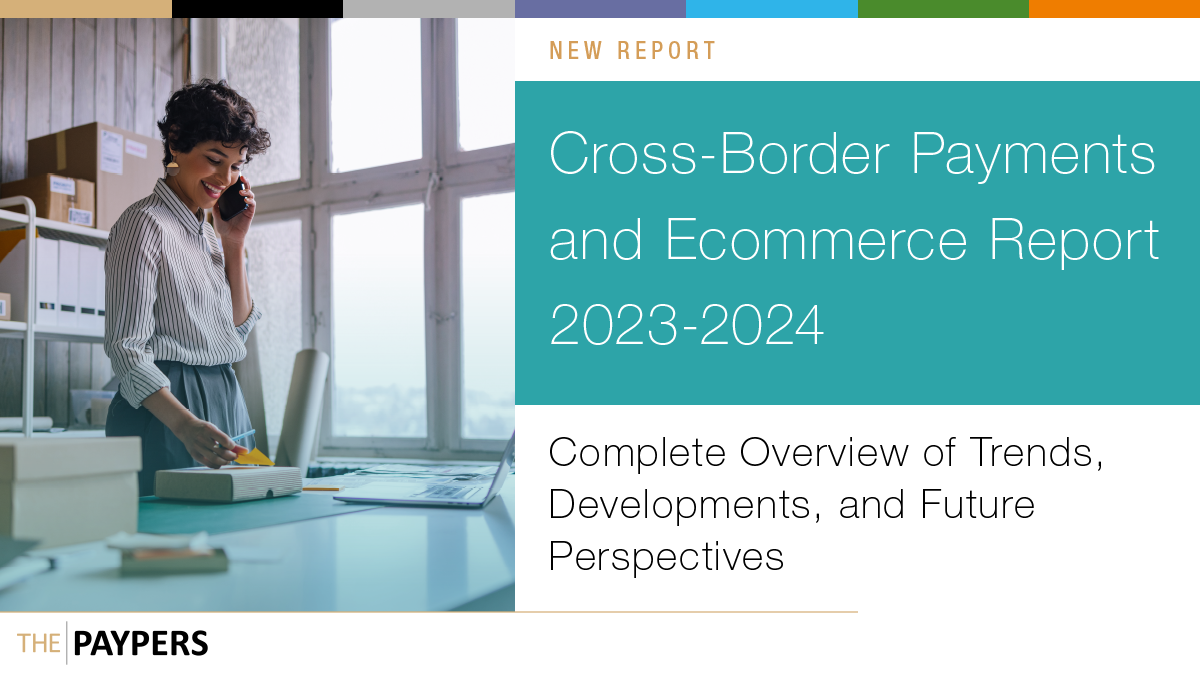The Paypers Cross-Border and Ecommerce Report 2023-2024
 This report from The Paypers continues the tradition of offering insights into the latest trends and developments in online payments and ecommerce.
This report from The Paypers continues the tradition of offering insights into the latest trends and developments in online payments and ecommerce.
In a time marked by uncertainty, businesses interested in expanding across borders must tread carefully, taking all risks into account and strategically leveraging available resources to ensure a comprehensive understanding of local challenges.
As online retail faces a slowdown in growth, particularly in domestic spending, cross-border ecommerce remains robust. Cross-border payments, in particular, have seen remarkable growth, with the industry reaching a total market size of USD 190.1 trillion in 2023.
This growth can be attributed to factors such as increased customer demand, international trade expansion, and globalisation. As we delve into the history of cross-border payments, it becomes evident that the evolution from barter systems to modern digital transactions has been shaped by technological innovations and socio-economic changes.
Recent developments, such as the introduction of SWIFT in 1973 and the emergence of blockchain technology and cryptocurrencies, have revolutionised
cross-border transactions, offering alternatives to traditional banking systems. However, challenges persist, including high fees, lack of transparency, and
limited accessibility for certain demographics.

In discussing the next decade of emerging technology, Richard Harrison, VP for Sales at Freemarket, highlights the transformative potential of blockchain, stablecoins, and artificial intelligence (AI) in cross-border payments. These innovations promise secure, transparent transactions and improved regulatory compliance, driving global economic growth.
Regulatory frameworks play a crucial role in shaping the future of cross-border payments, ensuring security
and compliance while fostering innovation.
Encouraging the development of new technologies and pricing models to meet evolving consumer demands for faster, cheaper, and more transparent transactions.
“With a forecasted USD 250 trillion market by 2027, cross-border payments are a key battleground. With this comes competition, a driving force for innovation.”
-Richard Harrison, VP for Sales, Freemarket
In our previous article on the Significance of Borderless Payments in today’s economy, we emphasised how bypassing traditional banking intermediaries streamlines peer-to-peer transactions, particularly benefiting small and medium-sized enterprises and freelancers. These payments also play a pivotal role in driving global trade, allowing businesses to expand internationally and supporting the gig economy by facilitating payments for freelancers working across borders.
Furthermore, borderless payments enhance the efficiency of remittances, providing significant benefits to recipients in developing countries.
Embracing these innovations remains essential for maintaining competitiveness in the global economy, as they continue to reshape industries and promote financial inclusion on a worldwide scale.

Jovi Overo, Managing Director at Unlimit, provides a valuable perspective on the crucial role of fintech in promoting financial inclusion and mentioned how businesses can leverage Banking-as-a-Service (BaaS) APIs to design products that cater to various customer needs, including different languages, currencies, and cultural preferences.
By partnering with a BaaS provider, businesses can quickly adapt their offerings to meet the legal and financial requirements of multiple regions, making their services accessible to a broader audience.
Incorporating inclusive design principles, such as simplicity and clarity, also ensures that financial products are user-friendly, regardless of their financial literacy levels.
“An attractive fintech UX should be intuitive and prioritise simplicity and clarity.”
-Jovi Overo, Managing Director, Unlimit
Fostering trust in fintech revolves around transparency, security, and customer support. Companies should be clear about their processes, fees, and data-handling practices. Implementing robust cybersecurity measures and complying with industry standards like PCI DSS reassures users of their data’s safety. Understanding and adhering to the regulatory requirements in each jurisdiction, such as GDPR in Europe or PSD2 for payment services, is critical.
In conclusion, as cross-border payments become increasingly integral to global economies and daily life, it is imperative to foster understanding and accessibility while striving to overcome existing challenges.
By embracing innovation and collaboration, we can pave the way for a more seamless and equitable cross-border payment landscape.
Download the full report here.
***
Payments Consulting Network proudly serves as an Endorsement Partner of The Paypers.
***
If you enjoyed reading this article and would like to be notified when future articles are posted, please sign up for our email newsletter.
Are you interested in reading articles on a particular payments topic, company, payments industry executive or author? Click the search icon, it’s that magnifying glass on the top right-hand side of the website and type in the keywords that interest you. You will then be presented with a list of any articles that match your search criteria.




